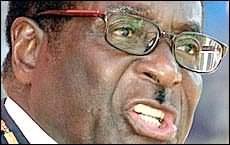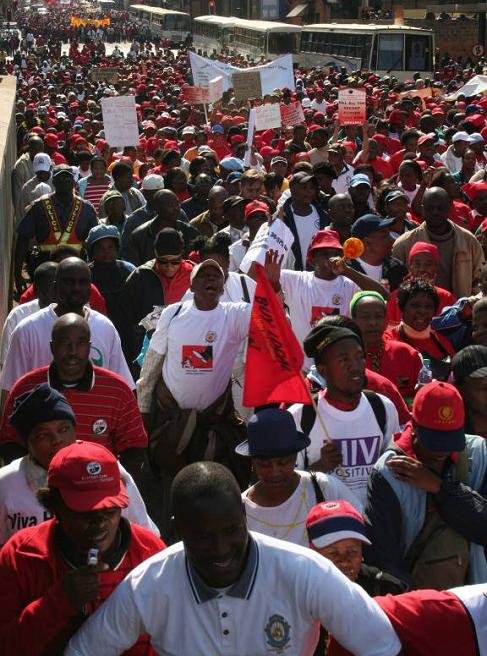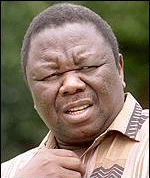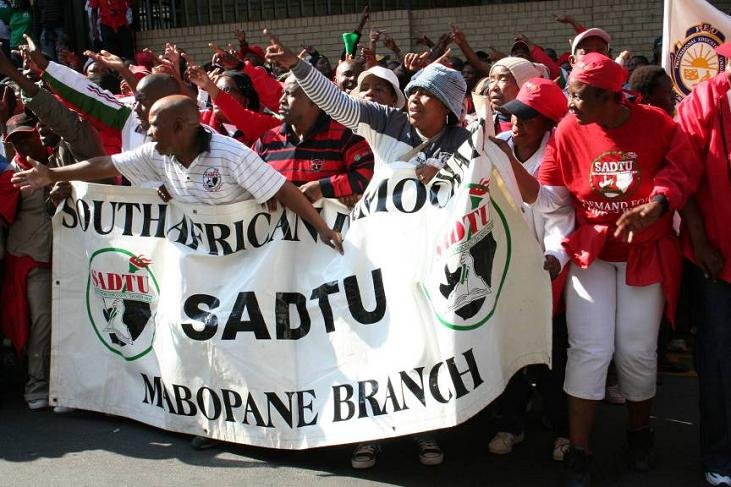
18th amendment could make or break Zimbabwe crisis
By Prof Jonathan Moyo MP
PREVIOUS ARTICLES BY THE HON PROF!
• Perfecting or messing up the constitution?
• Moyo withdraws suit against Dabengwa
• The Mugabe way
• 2008 Elections: one candidate, one united front
• Mugabe pins survival hopes on CIO
• Zimbabwe doomed as long as Mugabe stays on
• Rejecect Mugabe's ploy to rule forever
• Nkomo takes witness stand in defamation case
• Moyo on the Wits and Mbeki allegations
• Moyo quizzed on BBC HARDtalk
• Mugabe too tired to pull Zimbabwe out of woods
• Will nation leave Gono alone?
• Nathaniel Manheru: Professorial folly
• The 'useful idiot' has gone too far this time
• Mugabe's mess doesn't require British solution
• Moyo withdraws suit against Dabengwa
• The Mugabe way
• 2008 Elections: one candidate, one united front
• Mugabe pins survival hopes on CIO
• Zimbabwe doomed as long as Mugabe stays on
• Rejecect Mugabe's ploy to rule forever
• Nkomo takes witness stand in defamation case
• Moyo on the Wits and Mbeki allegations
• Moyo quizzed on BBC HARDtalk
• Mugabe too tired to pull Zimbabwe out of woods
• Will nation leave Gono alone?
• Nathaniel Manheru: Professorial folly
• The 'useful idiot' has gone too far this time
• Mugabe's mess doesn't require British solution
AFTER two months of groping in the shadows of the polarised and polarising Zanu PF and MDC politics, in what is arguably the last Sadc initiative to resolve the Zimbabwean crisis before the March 2008 general election, President Thabo Mbeki's Sadc-mandated mediation team led by Sydney Mufamadi must now specifically spotlight its effort on the proposed 18th constitutional amendment that is about to be gazetted by the beleaguered authorities in Harare.
If it does not do that without wasting any more time, then its effort will be doomed to embarrassing failure to the detriment of Mbeki's legacy and Sadc's reputation.
This shift in spotlight is necessary and urgent given the dogged if not suicidal determination by President Robert Mugabe to unilaterally use the proposed 18th constitutional amendment outside the Sadc mediation process to implement a self-serving Zanu PF plot to keep him in office for life in a manner that would prolong and worsen the current economic meltdown.
Up to now, Mbeki's Sadc mediation has lacked a tangible or specific focus that would not only establish the commitment of Zanu PF and the MDC to resolving the Zimbabwean crisis beyond partisan interests but which would also determine the success or failure of the mediation itself.
Public pronouncements by Mbeki that his mediation hopes to secure an electoral agreement between Zanu PF and the opposition to ensure that the 2008 general election would be conducted in such a way that its outcome would not lend itself to frivolous disputation on grounds of unfairness or unfreeness, have been useful for defining the key negotiation issues. But the pronouncements have not been enough in clarifying how the success or failure of the negotiation would be determined.
Most previous mediation efforts to resolve the Zimbabwean crisis by Mbeki have ended in failure — real or perceived — mainly because they were not driven by a transparent and well defined objective beyond talking for the sake of talking. The only notable exception that almost succeeded, and whose product might still see the light of day, is Mbeki's 2003/2004 quiet facilitation of dialogue between Patrick Chinamasa, then Zanu PF secretary for legal affairs, and Welshman Ncube, who was then secretary-general of the MDC before it split. That facilitation led to an agreement on a new draft constitution whose provisions included the best from the Constitutional Commission's 1999 draft that was rejected in a referendum in February 2000 and the National Constitutional Assembly's draft.
In terms of its content and relevance in addressing issues that remain contentious, the Chinamasa/Ncube draft constitution is still a product in good currency and it might very well find a new lease of life as the first prize in the ongoing Sadc mediation if all involved were to be serious and honest in the national interest. Adoption of that draft now would constitute 90% of the solution to the Zimbabwean crisis and the other 10% would depend on the outcome of the next general election.
But in the world of Zimbabwe's present treacherous politics of succession underwritten by unprecedented economic collapse with too many vested interests that are often not declared amid widespread national suffering, it would be too optimistic to expect Mbeki's Sadc mediation to produce the first prize by reviving the Chinamasa/Ncube draft constitution. That is why there is a need for an alternative but transparent and well-defined focus that would be a second prize in the form of the proposed 18th constitutional amendment.
| "SA mediators should dissuade Zanu PF and the MDC from their polarising politics of asserting each other's alleged illegitimacy as either violent puppets masquerading as democrats or violent electoral thieves masquerading as nationalist revolutionaries" |
| PROF JONATHAN MOYO |
Mbeki's Sadc mediation team should take it as fortunate that Mugabe has thus far been unable to steamroll to irreversibility his self-serving constitutional agenda that was unveiled at the controversial March 30 central committee meeting which endorsed his unpopular reelection bid. After that central committee meeting, which met only a day following the extraordinary Sadc summit in Dar es salaam had adopted the Mbeki mediation, the Zanu PF faction that is backing Mugabe's candidacy sought to rush through cabinet and parliament an 18th constitutional amendment bill containing the following patronage-inducing provisions in the main:
* An increase of the constituencies of the legislature in the lower house from 120 to 210;
* An increase of the number of senators in the upper house from 66 to 84;
* A requirement for the two houses of parliament to sit jointly as an electoral college to elect a president to serve for the remainder of the term of an incumbent who resigns, is impeached, dies or is otherwise incapacitated;
* Establishment of the long-awaited Human Rights Commission as a sweetener.
In seeking to rush this Bill in cabinet and parliament, Mugabe's henchmen wanted to preempt and sabotage Mbeki's Sadc mediation by turning it into a meaningless exercise in assured failure. After all Mugabe had already cynically interpreted the outcome of the March 29, Dar es Salaam Sadc summit as an endorsement of his brutality unleashed on defenceless opposition politicians in police custody on March 11.
Indeed, Mugabe has viewed the Sadc mediation right from its onset as a useful tool only in so far as it can help him contain international pressure on his government, expose opposition politicians as puppets and agents of imperialism, remove the international media spotlight on the March 11 state violence and get Sadc to support the Zanu PF position that the economic meltdown is due to alleged illegal sanctions imposed by Western countries and to provide an internationally backed economic rescue package against these sanctions ahead of the 2008 general election.
Outside these self-serving interests, Mugabe sees Mbeki's Sadc mediation as an utter nuisance which can easily become very dangerous if it is allowed to linger on for too long or if it is anchored on a concrete deliverable such as the proposed 18th constitutional amendment. That is why there have been frantic efforts since the central committee meeting of March 30 to rush and smuggle through this proposed amendment which is about to be gazetted with only Zanu PF electoral content.
This, together with the fact that it is now quite clear that Mugabe intends to use the proposed amendment to entrench his self-serving electoral interests to the detriment of the opposition in particular and the national interest in general right in the face of the Sadc mediation, means that Mbeki's team needs to get serious and tougher with Zanu PF and the MDC as a matter of urgency. If the team does not do that then its mediation is doomed to a kind of failure that would widen and deepen the current crisis.
The bottom line is that Mbeki's team should do everything possible under the auspices of Sadc not to allow Zanu PF to unilaterally author and make the proposed 18th constitutional amendment into law. Instead, this amendment which is inevitable before the 2008 general election must be the compromise point to signal the beginning of a genuine constitutional and political transition beyond the current crisis.
Sadc-mandated South African mediators should therefore dissuade both Zanu PF and the MDC from their polarised and polarising politics which have nothing to offer besides mutually asserting each other's alleged illegitimacy as either violent puppets masquerading as democrats or violent electoral thieves masquerading as nationalist revolutionaries.
This means that in addition to what Zanu PF has already indicated to be its desired content for the proposed 18th constitutional amendment, which now also interestingly includes provision for a prime minister and one vice-president in place of the current two vice-presidents, there must be serious consideration of the widespread democratic calls for the inclusion of the following, among other relevant constitutional issues necessary to ensure free and fair elections next year:
* An independent Registrar of Voters (it could be the Electoral Commission) to be fully and directly responsible for the registration of voters and the maintenance of a credible voters' roll;
* Making the delimitation and electoral commissions directly accountable to parliament and for the appointment of their chairpersons and commissioners to be subject to the approval of either the Judicial Service Commission or parliament and for their composition to necessarily reflect the full spectrum of Zimbabwe's political diversity, at least as represented in parliament;
* Allowing voter education to be undertaken by whoever Zimbabwean wants to in a free and transparent manner in accordance with the relevant laws;
* Enabling political parties and candidates to access the public media not only during the election period in the technical sense as happened in 2005 but well before the electoral period where and when it is known that there is an impending election as is now the case regarding the March 2008 general election.
If the government, Zanu PF and the MDC are serious and honest about their commitment to resolving the Zimbabwean crisis, then they should be able to understand why the proposed 18th constitutional amendment offers the best opportunity for a meaningful compromise towards the much needed transition from crisis to sustainable development under a democratic dispensation.
In the same vein, and for the same reasons, Mbeki's Sadc team must understand that if it keeps its eyes off or away from the 18th constitutional amendment it risks dropping if not losing the ball and that would most certainly result in embarrassing failure with catastrophic consequences.
Professor Moyo is a political scientist and MP for Tsholotsho (Indep). This article was
originally published in the Zimbabwe Independent

Peace and Tranquility???
 Peace and Tranquility??? |
Cell in RSA: 0791463039














No comments:
Post a Comment